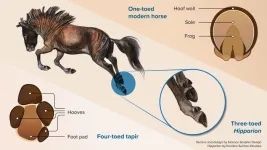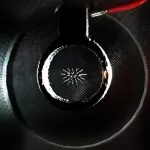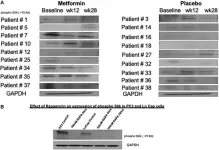(Press-News.org) Exposure to air pollution meant an average of around four extra days in hospital for Covid-19 patients, further increasing the burden on health care systems, according to a study published today (Wednesday) in the European Respiratory Journal [1].
The researchers say the effect of pollution on patients’ time in hospital was equivalent to being a decade older. Conversely, the effect of reducing exposure to pollution was 40 to 80% as effective in reducing patients’ time in hospital as some of the best available treatments.
In a second study, also published in the European Respiratory Journal [2], researchers have used data on all 3.7 million Danish people aged 30 or older to establish the impact of air pollution on Covid-19. They found that long-term exposure to pollution at levels well below current EU limits increased the risk of contracting Covid-19, being hospitalised and dying of the disease.
The first study was led by Professor Tim S. Nawrot from Hasselt University in Belgium. It included 328 patients who were hospitalised for Covid-19 between May 2020 and March 2021.
The research team used data on levels of three pollutants – nitrogen dioxide, soot and fine particles (PM2.5) – at the patients’ home addresses before they were hospitalised with Covid-19. They also measured the amount of soot in the patients’ blood.
The researchers compared this data with clinical outcomes, such as how long patients had to remain in hospital before they were well enough to go home and whether they were treated in intensive care. They took account of other factors that are known to affect Covid-19 infection, such as age, sex and body-mass index.
This showed that people exposed to higher levels [3] of fine particles and nitrogen dioxide in the week before they were hospitalised had to stay in hospital for more than four extra days on average. However, all levels of exposure were below the EU threshold. The size of the effect of air pollution on time in hospital was equivalent to the effect of a ten-year increase in age. The results also suggested that average exposure to higher levels of nitrogen dioxide and soot over the previous four years meant Covid-19 patients stayed longer in hospital on average.
Researchers found that higher levels of soot in the patients’ blood increased the likelihood of needing intensive care treatment by 36%.
Professor Nawrot said: “Our findings indicate that people who were exposed to air pollution, even at relatively low levels, were sicker and needed more time in hospital to recover. The pandemic placed an enormous strain on doctors, nurses and other healthcare workers. Our research suggests that air pollution made that burden even greater.”
Researchers in the second study used data from the Danish National Covid-19 Surveillance System from the first 14 months of the pandemic combined with detailed information on the levels of air pollution at people’s home addresses over the previous 20 years.
They found that increases in long-term exposure to nitrogen dioxide and fine particles, even at levels well below current EU limits, increased the risk of contracting Covid-19, being hospitalised and dying of the disease. People living with certain medical conditions, such as heart disease, asthma, diabetes and dementia, and those from more deprived backgrounds were even more susceptible the combined effects of air pollution and Covid-19.
Study author Dr Zorana Jovanovic Andersen from the University of Copenhagen, Denmark said: “These results show how air pollution can compromise our immune system and leave us vulnerable to Covid-19 and other respiratory infections.
“Reduction of air pollution should be in the heart of preventive measures for current and future pandemics, as well as a strategy for dealing with seasonal influenza pandemics. Cleaner air would make populations more resilient to respiratory infections, seasonal epidemics, and major pandemics in future.”
Professor Charlotte Suppli Ulrik from the University of Copenhagen, Denmark, is Head of the European Respiratory Society Assembly on the Environment and Epidemiology and was not involved in the research. She said: “We are finding more and more evidence that breathing polluted air is contributing to lung diseases, including infections. These studies show how exposure to air pollution at levels that are common in cities around Europe increased people’s risk of contracting Covid-19, becoming seriously ill and dying. The research also indicates how pollution exacerbated the strain on our hospitals and health services. Although the Covid-19 global health emergency is over, the impact of pollution on our health is continuing and we need governments to take action for the sake of our health and our health services.”
END
Air pollution, even at low levels, made Covid worse for patients and hospitals
2023-06-21
ELSE PRESS RELEASES FROM THIS DATE:
Modern horses have lost their additional toes, scientists confirm
2023-06-21
The distant ancestors of modern horses had hooved toes instead of a single hoof, which vanished over time, according to researchers.
The animals, such as the Eocene Hyracotherium, had feet like those of a modern tapir: four toes in front and three behind, each individually hooved with an underlying foot pad.
In contrast, modern equids such as horses, asses, and zebras, have only a single toe, the left over original third toe on each foot, encased in a thick-walled keratinous hoof, with an underlying triangular frog on the sole that acts as a shock absorber.
An international ...
Scientists discover critical factors that determine the survival of airborne viruses
2023-06-21
Critical insights into why airborne viruses lose their infectivity have been uncovered by scientists at the University of Bristol. The findings, published in the Journal of the Royal Society Interface today [21 June], reveal how cleaner air kills the virus significantly quicker and why opening a window may be more important than originally thought. The research could shape future mitigation strategies for new viruses.
In the first study to measure differences in airborne stability of different variants of SARS-CoV-2 in inhalable particles, ...
UK's young people at risk of leaving school without vital knowledge of reproductive health, study finds
2023-06-21
Pupils in the UK are not learning about potentially life-changing issues such as endometriosis, infertility, and miscarriage, according to a new study of curricula in science and in relationships and sex education.
Researchers from University College London (UCL) looked at what schools are expected to teach 14–18-year-olds across the UK, using curriculum requirements and specifications set by exam boards. Findings, published today in the peer-reviewed journal Human Fertility, demonstrate significant gaps and variations in what pupils are taught ...
Study explores climate change impacts on seagrass meadows
2023-06-21
Hidden beneath the waves of coastal waters lies an important member of the marine food chain – seagrasses. These marine meadows are in many ways the unsung heroes of the ocean, benefiting humans and the planet by producing oxygen, removing carbon dioxide from the air, and providing food and habitat for marine life. But these submerged savannahs may be in danger of disappearing, according to a new Stanford study that modeled the distribution of seagrass species around the world at two different timepoints in the future.
Climate change is expected to hit marine species hard, in part because oceans absorb an estimated ...
Helping define the impact of “art” in education
2023-06-20
Growing up, Brian Kisida always enjoyed going to school. He especially enjoyed the broad spectrum of subjects he was able to explore, including the arts. Now, as an assistant professor in the Truman School of Government and Public Affairs at the University of Missouri, he is researching the relationship between arts education and student success.
Over the years, Kisida, an expert on education policy, has seen the culture of education shift dramatically.
“I saw the impact that the test obsessed culture had on schooling, students’ mental health and enjoyment of learning,” Kisida said. “I wanted to know why we were seeing these changes that seem to not be in line ...
Precious1GPT: multimodal transfer learning for aging clock development and target discovery
2023-06-20
“The development of Precious1GPT [...] has demonstrated the potential of our approach in deciphering the molecular mechanisms of aging.”
BUFFALO, NY- June 20, 2023 – A new research paper was published in Aging (listed by MEDLINE/PubMed as "Aging (Albany NY)" and "Aging-US" by Web of Science) Volume 15, Issue 11, entitled, “Precious1GPT: multimodal transformer-based transfer learning for aging clock development and feature importance analysis for aging and age-related disease target discovery.”
Aging is a complex ...
Metformin's role in preventing metabolic syndrome during androgen deprivation therapy: a Phase II study
2023-06-20
“[...] we found no impact of the addition of metformin to [androgen deprivation] therapy on risk of metabolic syndrome associated with castration therapy and no additional anti-tumor effects.”
BUFFALO, NY- June 20, 2023 – A new research paper was published in Oncotarget's Volume 14 on June 19, 2023, entitled, “Utilizing metformin to prevent metabolic syndrome due to androgen deprivation therapy (ADT): a randomized phase II study of metformin in non-diabetic men initiating ADT for advanced prostate cancer.”
Androgen deprivation therapy (ADT) can lead to metabolic syndrome (MS) and is implicated in ADT-resistance. Metformin showed antineoplastic ...
Study: Microtargeting works, just not the way people think
2023-06-20
Recent U.S. elections have raised the question of whether “microtargeting,” the use of extensive online data to tailor persuasive messages to voters, has altered the playing field of politics.
Now, a newly-published study led by MIT scholars finds that while targeting is effective in some political contexts, the “micro” part of things may not be the game-changing tool some have assumed.
“In a traditional messaging context where you have one issue you’re trying ...
Brazilian fossil provides earliest evidence of evolutionary trait that enabled dinosaurs to become giants
2023-06-20
The missing link has just been found between the earliest dinosaurs, whose size ranged from a few centimeters to at most 3 meters in length, and more recent giants that could be more than twice the length of a bus and have so much appeal to the popular imagination.
Macrocollum itaquii, buried 225 million years ago in what is now Agudo, a town in Rio Grande do Sul state, South Brazil, is the oldest dinosaur studied hitherto with structures called air sacs.
These bone cavities, which persist in present-day ...
What role does alternative splicing play in neurodegenerative disease?
2023-06-20
RIVERSIDE, Calif. -- Alternative splicing, a clever way a cell generates many different variations of messenger RNAs — single-stranded RNAs involved in protein synthesis — and proteins from the same stretch of DNA, plays an important role in molecular biology. Progressing rapidly, the field of alternative splicing is a complex topic and the scientific literature on it is already extensive.
David Nikom, a student in the UC Riverside Neuroscience Graduate Program, and his advisor, Sika Zheng, an associate professor of biomedical sciences in the UCR School of Medicine and director of the Center ...





